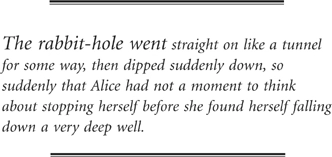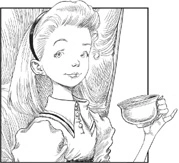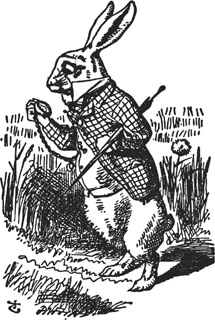Alice's Adventures in Wonderland
PUFFIN  CLASSICS
CLASSICS
Alice’s Adventures
in Wonderland

LEWIS CARROLL
Alice’s Adventures
in Wonderland

INTRODUCED BY
CHRIS RIDDELL
Illustrations by JOHN TENNIEL

PUFFIN
PUFFIN BOOKS
Published by the Penguin Group
Penguin Books Ltd, 80 Strand, London WC2R 0RL, England
Penguin Group (USA) Inc., 375 Hudson Street, New York, New York 10014, USA
Penguin Group (Canada), 90 Eglinton Avenue East, Suite 700, Toronto, Ontario, Canada M4P 2Y3
(a division of Pearson Penguin Canada Inc.)
Penguin Ireland, 25 St Stephen’s Green, Dublin 2, Ireland (a division of Penguin Books Ltd)
Penguin Group (Australia), 250 Camberwell Road, Camberwell, Victoria 3124, Australia
(a division of Pearson Australia Group Pty Ltd)
Penguin Books India Pvt Ltd, 11 Community Centre, Panchsheel Park, New Delhi – 110 017, India
Penguin Group (NZ), 67 Apollo Drive, Rosedale, North Shore 0632, New Zealand
(a division of Pearson New Zealand Ltd)
Penguin Books (South Africa) (Pty) Ltd, 24 Sturdee Avenue, Rosebank, Johannesburg 2196, South Africa
Penguin Books Ltd, Registered Offices: 80 Strand, London WC2R 0RL, England
puffinbooks.com
First published 1865
First published in Puffin Books 1946
Reissued in this edition 2008
3
Introduction copyright © Chris Riddell, 2008
Endnotes copyright © Penguin Books, 2008
All rights reserved
Except in the United States of America, this book is sold subject to the condition that it shall not, by way
of trade or otherwise, be lent, re-sold, hired out, or otherwise circulated without the publisher’s prior
consent in any form of binding or cover other than that in which it is published and without a similar
condition including this condition being imposed on the subsequent purchaser
978-0-14-190936-3
INTRODUCTION BY
CHRIS RIDDELL
‘ “What is the use of a book,” thought Alice, “without pictures or conversation?” ’
If you feel the same way, then you’ll love Alice’s Adventures in Wonderland. It is full of great conversations. Alice talks to a pipe-smoking caterpillar sitting on a magic mushroom, a sneezing Duchess nursing a baby pig, and a mad Hatter, a March Hare and a Dormouse at a tea-party. My favourite conversation is the one Alice has with a tearful Mock Turtle.
‘ “When we were little,” the Mock Turtle went on at last, more calmly, though still sobbing a little now and then, “we went to school in the sea. The master was an old Turtle – we used to call him Tortoise –”
‘ “Why did you call him Tortoise, if he wasn’t one?” Alice asked.
‘ “We called him Tortoise because he taught us,” said the Mock Turtle angrily: “really you are very dull!” ’
Just as good as the conversations are the pictures. These were drawn by a famous political cartoonist called John Tenniel and they bring the strange world of Wonderland vividly to life. There are lizards flying out of chimney pots, fat men doing amazing somersaults, frogs dressed as footmen and a large Cheshire Cat with a huge grin. My favourite illustration in the whole book is the very first. It shows the White Rabbit looking at his pocket-watch, worrying that it’s late. I copied that White Rabbit hundreds of times in my sketchbooks, trying to capture the worried expression in his eye, the folds of his coat and the wonderful shading at his feet.
It all began on 4 July 1862, when a young Oxford mathematics lecturer called Charles Dodgson and a friend rowed three children up the Thames from Oxford to Godstow for a picnic. I walked to the same spot and it is a magical place, but I didn’t see any white rabbits in waistcoats. It was different a hundred and fifty years ago when Dodgson had his picnic. ‘On which occasion,’ he wrote in his diary, ‘I told them the fairy-tale of “Alice’s Adventures Underground”.’ The youngest of the three children, Alice Liddell, exclaimed at the end of the outing as they returned to Oxford, ‘Oh, Mr Dodgson, I wish you would write out Alice’s Adventures for me!’ So he did.
That picnic fairy-tale was Alice’s Adventures in Wonderland which, together with Tenniel’s unforgettable illustrations, went on to become one of the most famous children’s books in the world. Charles Lutwidge Dodgson chose his pen-name by taking his Christian names and translating them into Latin before reversing the order and turning them back into English. So Charles Lutwidge became Carolus Ludovicus, which, reversed, became Lewis Carroll. It is just like something out of Wonderland.
When I was nine, I was thrilled when it was announced that the school play that year was to be an adaptation of Alice’s Adventures in Wonderland. Of course, I auditioned for the part of the White Rabbit, with his umbrella and pocket-watch and fabulous long white ears. I was devastated when I didn’t get the part. I soon cheered up, though, when I was cast as the March Hare. I still got to wear some wonderfully long ears and although I didn’t have an umbrella or pocket-watch, I did get to eat cake – lots of it at the tea-party! After all, what is the use of a school play, I always say, without large ears and cake?
Contents
PUBLISHER’S NOTE
The text of this edition of Alice in Wonderland is that of the first edition. A few verbal changes were made in later editions, but these were of minor importance, with one exception. The verses on pages 116 and 118 were later expanded, and the full version known to all Alice-lovers is as follows:
‘’Tis the voice of the Lobster; I heard him declare,
“You have baked me too brown, I must sugar my hair.”
As a duck with its eyelids, so he with his nose
Trims his belt and his buttons, and turns out his toes.
When the sands are all dry, he is gay as a lark,
And will talk in contemptuous tones of the Shark.
But, when the tide rises and sharks are around,
His voice has a timid and tremulous sound.
I passed by his garden, and marked, with one eye,
How the Owl and the Panther were sharing a pie.
The Panther took pie-crust, and gravy, and meat,
While the Owl had the dish as its share of the treat.
When the pie was all finished, the Owl, as a boon,
Was kindly permitted to pocket the spoon:
While the Panther received knife and fork with a growl,
And concluded the banquet –
All in the golden afternoon
Full leisurely we glide;
For both our oars, with little skill,
By little arms are plied,
While little hands make vain pretence
Our wanderings to guide.
Ah, cruel Three! In such an hour,
Beneath such dreamy weather,
To beg a tale of breath too weak
To stir the tiniest feather!
Yet what can one poor voice avail
Against three tongues together?
Imperious Prima flashes forth
Her edict ‘to begin it’ –
In gentler tone Secunda hopes
‘There will be nonsense in it!’ –
While Tertia interrupts the tale
Not more than once a minute.
Anon, to sudden silence won,
In fancy they pursue
The dream-child moving through a land
Of wonders wild and new,
In friendly chat with bird or beast –
And half believe it true.
And ever, as the story drained
The wells of fancy dry,
And faintly strove that weary one
To put the subject by,
‘The rest next time –’ ‘It is next time!’
The happy voices cry.
Thus grew the tale of Wonderland:
Thus slowly, one by one,
Its quaint events were hammered out –
And now the tale is done,
And home we steer, a merry crew,
Beneath the setting sun.
Alice! a childish story take,
And with a gentle hand
Lay it where Childhood’s dreams are twined
In Memory’s mystic band,
Like pilgrim’s wither’d wreath of flowers
Pluck’d in a far-off land.

1
Down the Rabbit-Hole
Alice was beginning to get very tired of sitting by her sister on the bank, and of having nothing to do: once or twice she had peeped into the book her sister was reading, but it had no pictures or conversations in it, ‘and what is the use of a book,’ thought Alice, ‘without pictures or conversation?’
So she was considering in her own mind (as well as she could, for the hot day made her feel very sleepy and stupid), whether the pleasure of making a daisy-chain would be worth the trouble of getting up and picking the daisies, when suddenly a White Rabbit with pink eyes ran close by her.
There was nothing so very remarkable in that; nor did Alice think it so very much out of the way to hear the Rabbit say to itself, ‘Oh dear! Oh dear! I shall be too late!’ (when she thought it over afterwards, it occurred to her that she ought to have wondered at this, but at the time it all seemed quite natural); but when the Rabbit actually took a watch out of its waistcoat-pocket, and looked at it, and then hurried on, Alice started to her feet, for it flashed across her mind that she had never before seen a rabbit with either a waistcoat-pocket, or a watch to take out of it, and burning with curiosity, she ran across the field after it, and fortunately was just in time to see it pop down a large rabbit-hole under the hedge.
In another moment down went Alice after it, never once considering how in the world she was to get out again.
The rabbit-hole went straight on like a tunnel for some way, and then dipped suddenly down, so suddenly that Alice had not a moment to think about stopping herself before she found herself falling down a very deep well.
Either the well was very deep, or she fell very slowly, for she had plenty of time as she went down to look about her, and to wonder what was going to happen next. First, she tried to look down and make out what she was coming to, but it was too dark to see anything; then she looked at the sides of the well, and noticed that they were filled with cupboards and book-shelves: here and there she saw maps and pictures hung upon pegs. She took down a jar from one of the shelves as she passed; it was labelled ‘ORANGE MARMALADE’, but to her great disappointment it was empty: she did not like to drop the jar for fear of killing somebody, so managed to put it into one of the cupboards as she fell past it.
‘Well!’ thought Alice to herself, ‘after such a fall as this, I shall think nothing of tumbling down stairs! How brave they’ll all think me at home! Why, I wouldn’t say anything about it, even if I fell off the top of the house!’ (Which was very likely true.)
Down, down, down. Would the fall never come to an end! ‘I wonder how many miles I’ve fallen by this time?’ she said aloud. ‘I must be getting somewhere near the centre of the earth. Let me see: that would be four thousand miles down, I think –’ (for, you see, Alice had learnt several things of this sort in her lessons in the schoolroom, and though this was not a very good opportunity for showing off her knowledge, as there was no one to listen to her, still it was good practice to say it over) ‘– yes, that’s about the right distance – but then I wonder what Latitude or Longitude I’ve got to?’ (Alice had no idea what Latitude was, or Longitude either, but thought they were nice grand words to say.)
Presently she began again. ‘I wonder if I shall fall right through the earth! How funny it’ll seem to come out among the people that walk with their heads downwards! The Antipathies, I think –’ (she was rather glad there was no one listening, this time, as it didn’t sound at all the right word) ‘– but I shall have to ask them what the name of the country is, you know. Please, Ma’am, is this New Zealand or Australia?’ (and she tried to curtsey as she spoke – fancy curtseying as you’re falling through the air! Do you think you could manage it?) ‘And what an ignorant little girl she’ll think me for asking! No, it’ll never do to ask: perhaps I shall see it written up somewhere.’
Down, down, down. There was nothing else to do, so Alice soon began talking again.
1 comment